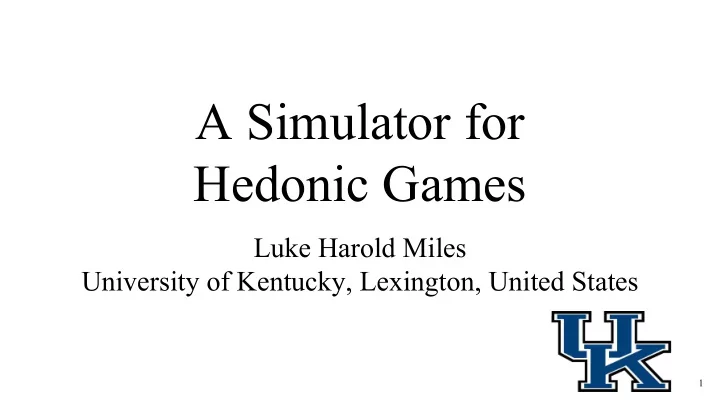

A Simulator for Hedonic Games Luke Harold Miles University of Kentucky, Lexington, United States 1
What’s a hedonic game? A set of players and, for each player, a ranking of possible groups to join 2
Example of a Hedonic Game Favorite group Loathed group Austin: AG > A A > A AGC AC > A Possible partitions: Dr AG > G G > G AGC GC {AGC} Goldsmith: > G {AG, C} {A, GC} {AC, G} Cory: AKC > C KC > C AC > C C {A, G, C} 3
Basic Notation G = (N, {≥ i : i ∈ N}) is a hedonic game. N is the (finite) set of players. Each ≥ i is a ranking of the coalitions containing i . A class of hedonic games is any (finite or infinite) set of hedonic games. N = {Austin, Dr G, Cory} π is a partition of N . π = {{Austin, Dr G}, {Cory}} π(i) is the coalition in π containing i . 4
Core stability A (nonempty) coalition C blocks a partition π iff every player i in C would be happier in C than in π(i) . i.e., C blocks π iff ∀ i ∈ C: C > i π(i) . π is core stable iff no possible coalition C ⊆ N blocks π . 5
Core Stability with Austin, Dr G, and Cory Favorite group Loathed group Austin: AG > A A > A AGC > A AC Possible Core stable? partitions: Dr AG > G G > G AGC > G GC {AGC} No. AG blocks Goldsmith: {AG, C} Yes! {A, GC} No. G blocks {AC, G} No. A blocks Cory: AKC > C KC > C AC > C C {A, G, C} No. AG blocks 6
Core Stability with Austin, Dr G, and Cory (version 2) Favorite group Loathed group Austin: AG > A AC > A A > A AGC Possible Core stable? partitions: Dr GC > G AG > G G > G AGC {AGC} No. AG blocks Goldsmith: {AG, C} No. GC blocks {A, GC} No. AC blocks {AC, G} No. AG blocks Cory: AC > C GC > C C > C AGC {A, G, C} No. AG blocks 7
Two frequently-asked questions Given a class of hedonic games... 1. Is there always a core-stable partition? 2. If not, how hard is it to decide? 8
Friend-Oriented Hedonic Games Each player labels every other player as either a friend or an enemy. Ranking: More friends is a lot better; fewer enemies is a little better. 1. Is there always a core-stable partition? Yes (Dimitrov, Borm, Hendrickx, Sung. 2006.) 9
Enemy-Oriented Hedonic Games Each player labels every other player as either a friend or an enemy. Ranking: Fewer enemies is a lot better; more friends is a little better. 1. Is there always a core-stable partition? Yes (Dimitrov, Borm, Hendrickx, Sung. 2006.) 10
Fractional Hedonic Games Each player scores every other player. (e.g. Cory ranks Austin 3.46) Ranking: Higher average score is better. 1. Is there always a core-stable partition? No p -complete! 2. How hard is it to decide? Σ 2 (Aziz, Brandl, Brandt, Harrenstein, Olsen, Peters. 2017.) 11
Altruistic Hedonic Games Each player labels every other player as either a friend or an enemy. Ranking: “I’ll pick the coalition in which my friends and I are both happy.” 1. Is there always a core-stable partition? No 2. How hard is it to decide? Varies (Nguyen, Rey, Rey, Rothe, Schend. 2016.) 12
The Simulator 13
Screenshot 14
Make adjacency list 15
Make partition 16
Choose Class of Hedonic Games 17
Choose Stability Notion 18
Compute Scores 19
Recommend
More recommend